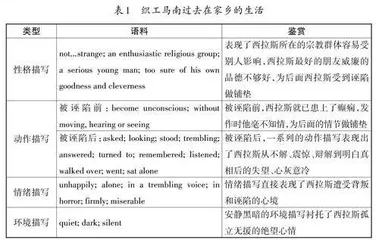跟着名著学续写之生命的价值
作者: 谢秀娟

生命的价值与意义是每个人都必须面对的命题。每个人对生命的意义都有自己的独特见解。本次读后续写之生命价值类专题将以《织工马南传》里面的主角织工西拉斯·马南的生活为例,分为三部分:织工马南过去在家乡的生活,织工马南在乡村收养爱比前离群索居的生活,以及织工马南在乡村收养爱比后充实快乐的生活。本专题将由此探究生命的价值与意义。
主题微语境
《织工马南传》的作者是英国作家乔治·艾略特。小说叙述了老实善良的织布工人西拉斯·马南命途多舛,在历经种种挫折后重拾信仰,找到人生价值和意义的故事。
一、织工马南过去在家乡的生活
被诬陷前
1. Because he was one of a large number of weavers, he was not considered strangeand he belonged to an enthusiastic religious group. They met every Sunday at the chapelin Light Street. 作为众多织工中的一个,他很平常,而且他属于一个活跃的宗教组织。教友们每个礼拜日都在日光街的小教堂集会。
2. Once, at a chapel meeting, Silas had become unconscious and had sat withoutmoving, hearing or seeing, for over an hour. 曾经,在一次教堂集会中,西拉斯突然失去了知觉,坐在那里一动不动,听不到也看不到,长达一个多小时。
3. Silas best friend at chapel was William Dane, a serious young man who was,some people thought, a little too sure of his own goodness and cleverness. 西拉斯在教会最要好的朋友是威廉·戴恩,一个严肃的年轻人,有的人认为他对自己的聪明和善良未免太有把握。
4. One night, Silas was sitting alone at the old mans bedside. Time seemed to passslowly in the quiet, dark room. 一天晚上,西拉斯独自陪坐在老人的床边。在黑暗而安静的屋子里,时间似乎过得很慢。
被诬陷后
1.“ But why?” asked Silas, looking unhappily at them.“ 但是为什么?”西拉斯问道,不太高兴地看着他们。
2. Then, in the chapel, Silas stood alone, in front of all the people who were once hisfriends. The room was silent. There was a pocket knife in the ministers hand. 然后,在教堂里,西拉斯独自站在他以前的朋友们面前。屋里很静。牧师的手里拿着一把小刀。
3. Silas was trembling at this strange question.“ I dont remember,” he answered. 西拉斯被这个奇怪的问题吓得发抖。“ 我不记得了。”他回答。
4. Silas turned to the man he had always trusted.“ William, in the nine years sinceweve been friends, have I ever told you a lie? But God will prove the truth.” As he lookedat William, he suddenly remembered something, and reddened. He said in a tremblingvoice,“ The knife wasnt in my pocket last night!” 西拉斯转向这个他曾经信赖的朋友。“威廉,在我们做朋友的9年里,我有没有对你说过一句谎?上帝会证明真相。”看着威廉,西拉斯突然想起来了什么,脸红起来。西拉斯颤抖地说:“刀子昨晚不在我的兜里!”
5. Silas listened in horror. At last he walked over to William Dane and said firmly,“I lent you my knife, you know that. You stole the money, while I was having a fit, andyouve blamed me for it. But perhaps youll never be punishes, since there is no God whotakes care of the good and punishes the bad, only God of lies.” 西拉斯惊恐地听着。最后他走到威廉·戴恩的面前坚定地说:“我把刀子借给你了,你知道的。你趁我发病的时候偷了钱,并以此归罪于我。不过你可能永远也不会受到惩罚,因为根本没有一个保护善良、惩治邪恶的上帝,只有一个说谎的上帝。”
6. Silas went home. The next day he sat alone for the whole day, too miserable to doanything. 西拉斯回到家里。第二天,他独自在屋里待了一整天,痛苦得不能做任何事。
二、织工马南在乡村收养爱比前离群索居的生活
1. At Raveloe, Silas shut himself away in his cottage. He did not want to thinkabout the disaster he had experienced. He could not understand why God had refused tohelp him. But now that his trust in God and his friends had been broken, he did not feelstrong enough to build up that trust again, in a new church and with new friends. Fromnow on, he would live in a dark, loveless, hopeless world. All that was left to him was hisweaving, and he sat at his loom seven days a week, working all the daylight hours. Inthe town he had earned less, and had given much of his money to the chapel, for the old,the poor, and the sick. But now he began to earn more than ever before, and there was noreason for him to give any of it. He was often paid for his linen in gold. He discovered thathe liked holding the shining coins in his hand and looking at their bright faces. 在瑞福洛,西拉斯把自己关在小屋里。他不愿意再去想那些他经历过的苦难。他不明白为什么上帝拒绝帮助他。但既然他对上帝和朋友的信任都已经崩溃了,他已没有足够的信心再到新的教堂去和新的朋友一起重建信任。从此,他要开始生活在一个黑暗的、没有爱也没有希望的世界里。西拉斯剩下的只有织布,并且他一周七天都坐在织布机前面从早到晚地工作。在城里他挣得不多,而且他把大部分钱捐给了教会去帮助老人、穷人和病人。但现在他开始挣得比以前多,而且对他而言也没有理由再把钱给出去了。他经常收到金币,作为卖出亚麻布的报酬,他发现自己喜欢把闪闪发光的金币拿在手里,看着它们闪亮的表面。
2. But little by little, the piles of gold coins in his cottage grew higher. The harder heworked, the less he spent on himself. He counted the coins into piles of ten, and wanted tosee them grow into a square, and then into a larger square. He was delighted with everynew coin, but it made him want another. His gold became a habit, a delight, a reason forliving, almost a religion. He began to think the coins were his friends, who made the cottageless lonely for him. But it was only at night, when he had finished his work, that he spenttime with them. He kept them in two bags, under the floor boards near the loom. Like athirsty man who needs a drink, he took them out every evening to look at them, feelthem, and count them. The coins shone in the firelight, and Silas loved every one ofthem. When he looked at his loom, he thought fondly of the gold earned in the work he wasdoing, and he looked forward to the years ahead of him, the countless days of weaving andthe growing piles of gold. 但慢慢地,他小屋里的金币越码越高。他干活越卖力,为自己花的钱就越少。他把金币每十个码成一摞,想象着它们变成一片,再变成一大片。每一枚新的金币都使他高兴,但也使他更渴望得到下一枚金币。他的金币成了一种习惯,一种喜悦,一个活着的原因,甚至成了一个信仰。他开始认为金币是他的朋友,它们使他在小屋里不再那么寂寞。但只有在晚上,当他结束了一整天的工作,他才有时间陪伴它们。他把它们放在织布机旁边地板下的两个袋子里。像口渴的人需要喝水一样,他每天晚上都要把它们拿出来看一看,摸一摸,数一数。金币在炉火的照耀下闪闪发光,西拉斯爱它们当中的每一个。每当看到织布机,西拉斯都喜悦地想到在工作中挣到的金币,他憧憬着未来的岁月,憧憬着今后数不清的织布的日子和越堆越高的金币。